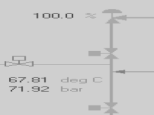Home
Systems Engineering
Subsea Control Systems
Software Development
Products and Applications
Tech Info
Contacts & Key Personnel
|
|
Subsea Control Systems
Integrated Subsea Control Systems

|
|
For many years, a master control station (MCS) was used to control the Subsea Electronics
Modules (SEMs) via the electro-hydraulic umbilical. The MCS was typically connected to the
topsides DCS via a serial link (using, for example, Modbus protocol), which provided data acquisition from subsea sensors, and
allowed control of valves.
|
Over the last few years, however, there has been a movement towards the use of Integrated
Control Systems, where the topsides control system communicates directly with the SEMs. This
eliminates the requirement for a Master Control Station, which in most cases functioned only
as a protocol converter.
There are significant cost savings due to eliminating the Master Control Station, and there are technical
benefits too:
- Better integration with the topsides control system. There are many advantages, such as:
- Standard function blocks can be used. The programming of the subsea logic uses the same methodology
as the topsides.
- Alarm processing is simplified. There is only one alarm system, with no duplication of alarms.
- Simplified configuration. With an MCS and a DCS, two databases need to be maintained. With an
Integrated Control System, there is just one.
- Detailed SEM data. An many cases, an Integrated Control System provides detailed diagnostic data from
the SEM that is simply not available via the MCS serial link, a case in point being with downhole gauges.
- Simplified diagnostic capability. The engineer or technician can use a display at the ICS to perform
diagnostics, without having to use the MCS or complicated SEM diagnostic software.
Process IT's engineers have integrated the systems from two of the major subsea
control suppliers into the Honeywell HPM:
- ABB Seatec
Originally developed for Norsk Hydro's Troll Olje project
(North Sea, Norwegian sector), and
subsequently used on Esso Blackback (Bass Strait, Australia)
- Kvaerner FSSL
Developed for Woodside Energy's Laminaria FPSO (Timor Sea)
|





